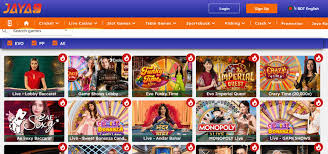
The Intersection of Social Media & Sports Betting: Trends and Insights
The evolution of technology has brought forth transformative changes in various industries, and the realm of sports betting is no exception. In recent years, the convergence of social media and sports betting has led to a dynamic landscape that influences betting habits, fosters community engagement, and reshapes marketing strategies. Platforms like Twitter, Instagram, and Facebook are reshaping how bettors interact with each other and the betting industry. Additionally, the rise of mobile applications, such as the Social Media & Sports Betting in Bangladesh jaya 9 casino live app, allows for seamless access to betting opportunities at any time.
Social media platforms are not just avenues for communication; they serve as vital tools for information dissemination, engagement, and entertainment within the sports betting community. Bettors can share insights, tips, and experiences instantaneously, creating a vibrant ecosystem that enriches the sports betting experience. With the growing acceptance of sports betting in various jurisdictions, social media’s role in driving interest and participation in this activity is more critical than ever.
The Role of Social Media in Sports Betting
One of the primary impacts of social media on sports betting is the ability to engage a broader audience. Platforms allow bookmakers and bettors to communicate directly, fostering a sense of community that was previously unavailable. Bettors often share their predictions, strategies, and analyses, creating a collaborative environment where everyone can learn from one another. Infamous Twitter handles or Instagram influencers specializing in sports betting often gain large followings, offering valuable insights to their audiences.
Social media also serves as a rich source of data and real-time information. Bettors can follow teams, players, and recent game analyses through these platforms, offering them more informed decision-making capabilities. As news breaks in real-time (injuries, trades, weather conditions, etc.), bettors can immediately adjust their strategies. This instant access to critical information means that social media is not just a casual pastime but a legitimate resource for serious bettors.
Influencer Culture and Its Impact

In the age of social media, influencer culture plays a crucial role in shaping betting behaviors. Influencers with substantial followings can sway the betting decisions of their fans. This phenomenon has given rise to a ‘betting influencer’ industry, where individuals share their bets and provide analysis in hopes of guiding others. While some influencers offer genuine insights, others may promote dubious strategies or featured sites for personal gain, making it essential for followers to approach such content critically.
Furthermore, partnerships with sports teams and gaming companies have led to the promotion of influencers in promotional content. Betting companies are increasingly leveraging these influencers to reach a more extensive audience, promoting responsible gambling while offering enticing bonuses and betting incentives.
The Dangers of Social Media in Sports Betting
While social media provides numerous advantages, it is not without its drawbacks. One major concern is the potential for misinformation. In an environment where news spreads quickly, incorrect information can lead to misguided bets, resulting in significant financial losses. Additionally, the echo chamber effect of social media can amplify poor betting practices or strategies.
Another critical issue is the pressure to conform. Gamblers might feel compelled to follow trends or adopt strategies pushed by influencers, reflecting a herd mentality. This pressure can lead to impulsive betting decisions, straying from individual risk assessments and strategies. It is crucial for bettors to remain vigilant and develop their own informed betting strategies, rather than relying solely on social media buzz.
Mobile Applications: The New Era of Betting

The rise of mobile applications for sports betting has revolutionized the industry. These applications provide bettors with instant access to odds, live betting features, and a range of betting options right at their fingertips. The convenience of mobile betting allows users to place bets anytime, anywhere, further intertwining sports betting with daily life.
Mobile applications are also integrating social media features, enabling users to share their betting experiences with friends and followers. Features such as “bet slips” can be shared on platforms like Instagram or Twitter, enhancing social sharing and interaction among bettors. Moreover, many applications offer personalized notifications, informing users about critical updates, promotions, or events related to their betting interests.
Future Trends: What Lies Ahead?
As technology continues to progress, the integration of social media and sports betting will only deepen. Innovations such as augmented reality (AR) and virtual reality (VR) have the potential to create immersive betting experiences, enabling users to engage with sports events in new ways. Picture a scenario where bettors can participate in virtual matches, placing bets in real-time as they navigate through a fully immersive environment.
The use of artificial intelligence (AI) is also expected to rise in sports betting. AI can analyze vast amounts of data, predict outcomes, and provide tailored betting recommendations based on user behavior. Social media platforms may further harness this technology to deliver personalized content, enhancing user engagement and ensuring that bettors receive information relevant to their interests and betting patterns.
In conclusion, the intersection of social media and sports betting creates a vibrant ecosystem filled with opportunities and challenges. Social media platforms have democratized information sharing and fostered community engagement among bettors. However, they also present risks, including misinformation and the pressure to conform to trends. As technologies evolve and mobile applications become more integrated with social media features, the future of sports betting will undoubtedly be influenced by these platforms, shaping how bettors interact with each other and with the industry as a whole.

